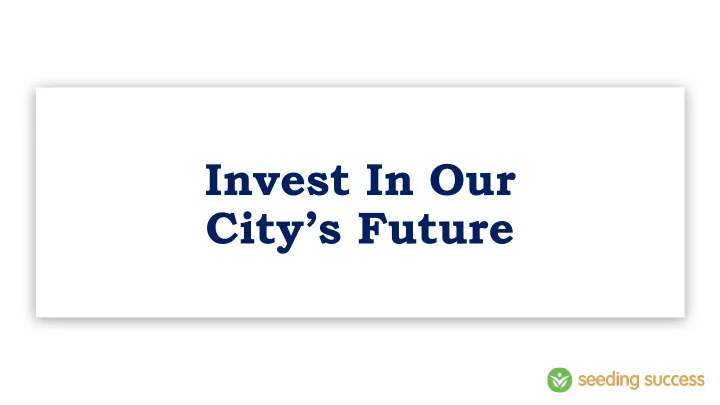

Invest In Our City’s Future
Why early childhood? Adults who participated in high-quality early childhood education programs during their preschool years are more likely to be literate and enrolled in post-secondary education and are less likely to drop out of school, need public assistance, or be incarcerated
Why early childhood? High Quality pre-K programs have demonstrated a $7-8 return on investment for every $1 spent
Current state Today in Memphis, more 4-year olds have access to pre-K than ever before, and it is getting great results
Current state In the last two years, we have increased pre-K seats by 37% (2,000 seats) and improved quality
Head Start center-based istation results Percent of 4-year-olds on grade level 82% 71% 71% 58% 57% Beginning 50% Year-end 2016-2017 2014-2015 2015-2016
Pre-K students increased the district average to 59% in 2017 59% Percent of students Kindergarten ready 2016 49% 2017
Current state 59% 59% 56% Percent Kindergarten ready Total population Pre-K Non-PreK Pre-K year: 2016-2017 Current grade: Kindergarten
Current state Pre-K year: 2015-2016 Current grade: 1st Non-PreK & non economically disadvantaged Pre-K Non-PreK & economically disadvantaged Average reading RTI score on MAP
Current state Pre-K year: 2014-2015 Current grade: 2nd Non-PreK & non economically disadvantaged Pre-K Non-PreK & economically disadvantaged Average reading RTI score on MAP
Current state Pre-K year: 2013-2014 Current grade: 3rd Non-PreK & non economically disadvantaged Pre-K Non-PreK & economically disadvantaged Average reading RTI score on MAP
Our goal 90% of all Shelby County students will be Kindergarten Ready by 2025
Our goal Increase capacity to full need-based enrollment by 2020
Current funding sources Federal Pre-K Grant - $8MM* State Pre-K Grant - $12MM Shelby County Commission - $3MM Federal Head Start Grant - $23MM City of Memphis-?
The problem In May 2019, $8MM in federal funding goes away. Absent new funding sources, we will will lose 1000 seats for Memphis 4 year-olds, and fall farther behind our ultimate goal of full need-based enrollment, or 8500 seats
The plan With a recurring investment from the City of Memphis, additional local funds, potential national capital, and technical assistance from our partners, we can develop a national model for funding an effective and sustainable early childhood education system
Part of a larger early childhood plan targeted at improving access and quality along the birth to 3 rd grade continuum 1. Establish incentives to create more high 10. Increase capacity of high-quality Pre-K programs 12. Build ecosystem of wraparound and supplemental quality seats in areas with unmet demand academic support providers in K-3rd Access & 2. Strengthen child care certificate distribution Awareness 3. Raise family and community awareness of value of early learning 8. Adopt a common definition of high-quality Pre-K 13. Mentor and train schools to expand on-campus SEL supports 4. Expand in home and unlicensed provider 9. Improve Pre-K quality 14. Strengthen pre-service preparation through exposure to more supports 11. Mitigate summer learning loss relevant coursework and classroom experience 5. Increase usage of developmental screeners 15. Enhance professional learning opportunities through more 6. Improve referral conversion for home Quality effective implementation of coaching, PLCs and PD visitation 16. Encourage district/school leadership to better align 7. Strengthen state QRIS instructional practices and expectations across the Pre-K to 3 rd continuum Adopt community-wide scorecard with measures across birth to 3 rd grade 8. Adopt common assessment approach from birth to 3 rd grade 9. 10. Recruit and retain high quality early educators 11. Implement a holistic place-based model Continuum 12. Build data sharing infrastructure to coordinate services and inform action 13. Build analytic, research and continuous improvement capability 14. The PeopleFirst Partnership, as the backbone organizations, to coordinate and oversee implementation of the Plan
How will it work? Establish an early childhood education fund housed at the Community Foundation, overseen by a board of advisors, establish grant-making through performance-based contracting and RFP process, and Seeding Success provides the Council on-going performance reporting and evaluation of ROI.
Questions?
Recommend
More recommend